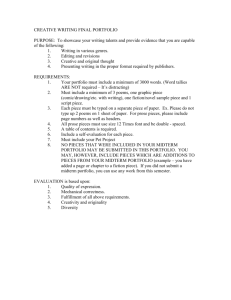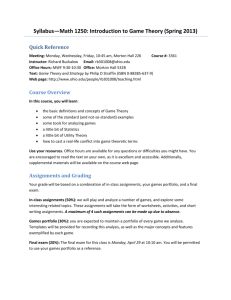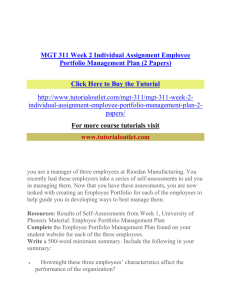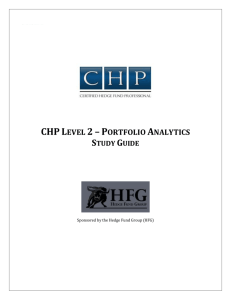Document
advertisement
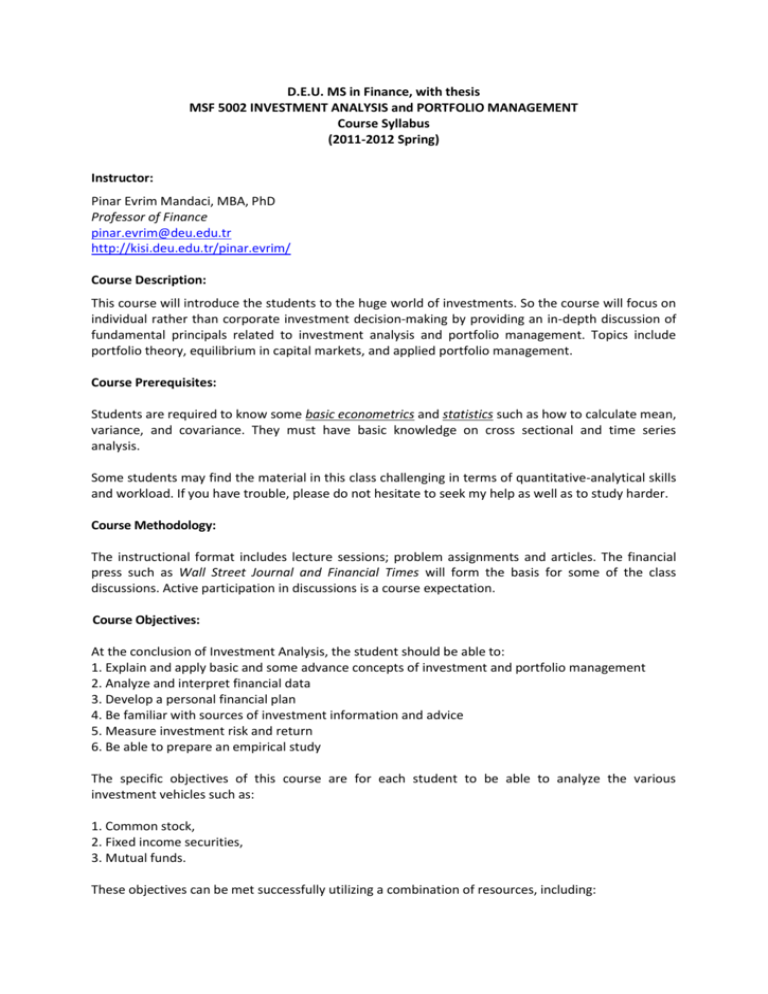
D.E.U. MS in Finance, with thesis MSF 5002 INVESTMENT ANALYSIS and PORTFOLIO MANAGEMENT Course Syllabus (2011-2012 Spring) Instructor: Pinar Evrim Mandaci, MBA, PhD Professor of Finance pinar.evrim@deu.edu.tr http://kisi.deu.edu.tr/pinar.evrim/ Course Description: This course will introduce the students to the huge world of investments. So the course will focus on individual rather than corporate investment decision-making by providing an in-depth discussion of fundamental principals related to investment analysis and portfolio management. Topics include portfolio theory, equilibrium in capital markets, and applied portfolio management. Course Prerequisites: Students are required to know some basic econometrics and statistics such as how to calculate mean, variance, and covariance. They must have basic knowledge on cross sectional and time series analysis. Some students may find the material in this class challenging in terms of quantitative-analytical skills and workload. If you have trouble, please do not hesitate to seek my help as well as to study harder. Course Methodology: The instructional format includes lecture sessions; problem assignments and articles. The financial press such as Wall Street Journal and Financial Times will form the basis for some of the class discussions. Active participation in discussions is a course expectation. Course Objectives: At the conclusion of Investment Analysis, the student should be able to: 1. Explain and apply basic and some advance concepts of investment and portfolio management 2. Analyze and interpret financial data 3. Develop a personal financial plan 4. Be familiar with sources of investment information and advice 5. Measure investment risk and return 6. Be able to prepare an empirical study The specific objectives of this course are for each student to be able to analyze the various investment vehicles such as: 1. Common stock, 2. Fixed income securities, 3. Mutual funds. These objectives can be met successfully utilizing a combination of resources, including: 1. Textbook and other readings, 2. Internet, 3. Lectures, 4. Current "Real World" market case studies and examples, 5. Homework assignments, 6. Examinations Student Responsibilities & Academic Honesty: No doubt that business succeeds based on trust and ethical behaviour by all parties. Consequently, I expect you to be ethical in your relationships with me and your friends as well as having good manners, integrity and discipline. I also expect each student to 1. Attend the class regularly on time in order to complete the course successfully. 2. Do all the reading and assigned problems as assigned for each class session. 3. Be conversant with current business and financial news and prepared to discuss events in class. 5. Participate in class discussions. 6. Complete the problem sets, which will be assigned in class. No problem set will be accepted after the due dates. Required Textbook and Materials Z. Bodie, A. Kane, A.J.Marcus, Investments, 8th ed., Mc-Graw Hill, 2009. Calculator: You will need a calculator, preferably a financial one such as HP 17BII Business, to do homework and exams (You are NOT allowed to use your cell phones as a calculator). The Financial Press: You are strongly encouraged to read the Wall Street Journal (www.wsj.com), the Financial Times (www.ft.com) by paying more attention to Money and Investing Sections and focus on articles relating to stocks and investment advice in general as well as local and global economy. Recommended Texts and other Readings: Haim Levy and Thierry Post (2005), Investments, Financial Times Prentice Hall, Charles Jones (2004), Investments: Analysis and Management, 9e, Wiley & Sons, Mark Hirschey and John Nofsinger (2008), Investments: Analysis and Behavior, McGraw Hill, Joel Greenblatt, (2006), “The Little Book That Beats the Market”, Some useful websites ready to explore: www.bloomberg.com www.business.com www.money.cnn.com www.marketwatch.com http://finance.yahoo.com www.barrons.com www.investors.com Grading System and Policy I understand the importance of grades to you. In return, I expect you to understand the importance of teaching properly to me. So, I will do my best to provide convenience and help, if I believe that you make a great effort during the semester. Students will be assessed on class preparation and participation, assigned activities, and exams. The grading components will be as follows: Homeworks and Problem Solutions in class Article Discussion (Memos) Midterm Final Exam Total 20% 10% 30% 40% 100% Homeworks and Problem Solutions in Class: I will give you some studies at home and problems in class. You have to solve the assigned problems in class individually. And you have to solve them in the given time period. Article Discussion (Memos): Each student is required to prepare a memo on the assigned articles of the week and be ready to discuss the articles for the next class. Memos should be should be at least three pages excluding cover page with a single spacing. Each of you must also be ready for the presentation of these articles. Midterm and Final Exams: We will have a midterm and a final exam. Please do not bargain with me on this issue. The final exam will cover all topics. Tentative Course Schedule Feb, 14 Welcome to Study Investment Analysis and Portfolio Management: Course Information PART I: PORTFOLIO THEORY AND PRACTICE Feb, 21 Topic: Chp 5: Learning about Return and Risk from the Historical Record Feb, 28 Topic: Chp 6: Risk Aversion and Capital Allocation to Risky Assets Mar, 6 Topic: Chp 6: Risk Aversion and Capital Allocation to Risky Assets cont. Article Assignments: Claude B. Erb, Campbell R. Harvey and Tadas E. Viskanta, “Expected Returns and Volatility in 135 Countries”, The Journal of Portfolio Management, Spring 1996, 46-58. Willard T. Carleton, Josef Lakonishok, “Risk and Return on Equity: The Use and Misuse of Historical Estimates”, Financial Analysts Journal, Jan-Feb 1985, 38-47. Mar, 13 Topic: Chp 7: Optimal Risky Portfolios Mar, 20 Topic: Chp 7: Optimal Risky Portfolios cont. (Appendix A and B) Article Assignments: Fischer Black and Robert Litterman, “Global Portfolio Optimization”, Financial Analysts Journal, SepOct 1992, 29-43. Yalçıner, K., Atan, M, Kayacan, M., Boztosun, D., “Optimization of a Portfolio through International Diversification”, Int. Conference on Business, Economics, and Management, Yasar University, 2005, Izmir, Turkey. PART II: EQUILIBRIUM IN CAPITAL MARKETS Mar, 27 Topic: Chp 8: Index Models Apr, 3 or 10 MIDTERM EXAM Apr, 17 Topic: Chp 9: The Capital Asset Pricing Model Article Assignments: Çelik Ş., Aktan, B., Mandaci, P.E., “Characteristics of Banks’ Common Stocks within the Framework on Capital Asset Pricing Model: Evidence from Turkey”, Investment Management and Financial Innovations, Vol: 5, Issue: 4, 2008, 143-157. Apr, 24 Topic: Chp 10: Arbitrage Pricing Theory and Multifactor Models of Risk & Return Article Assignments: Kapusuzoglu, A. “The Impact of Alpha, Beta, and Correlation Coefficients on the Processes of StockSelection and Portfolio Formation by the Investors: An Empirical Analysis on the Turkey Istanbul Stock Exchange (ISE)”, International Research Journal of Finance and Economics, 17, 2008: 57-68. May, 8 Topic: Chp 11: The Efficient Market Hypothesis Article Assignments: Mandaci, P.E., “Abnormal Return Fluctuations in the ISE Before and After the General Elections in Turkey”, Review of Istanbul Stock Exchange, Vol: 7, No: 27, 2003. Durukan Banu, Evrim-Mandacı Pınar, “The Relationship between stock Returns and Fundamental Variables: Evidence from ISE, Journal of Faculty of Business, Vol: 4, No: 1, 2003. PART III: APPLIED PORTFOLIO MANAGEMENT Apr, 15 Topic: Chp. 24 Portfolio Performance Evaluation May, 22 Topic: Chp 25 International Diversification Article Assignments: Mandaci, P.E., Torun, E. “Testing Integration between the Major Emerging Markets”, Central Bank Review, Vol: 7, No: 1, Jan. 2007. Mandaci, P.E., Torun, E., "Ebb and Flow? Cointegration between the emerging markets in EMEA and US with Structural Breaks”. International Journal of Economic Policy in Emerging Economics, Vol: 3, No: 1, 2010. May, 29 FINAL EXAM




